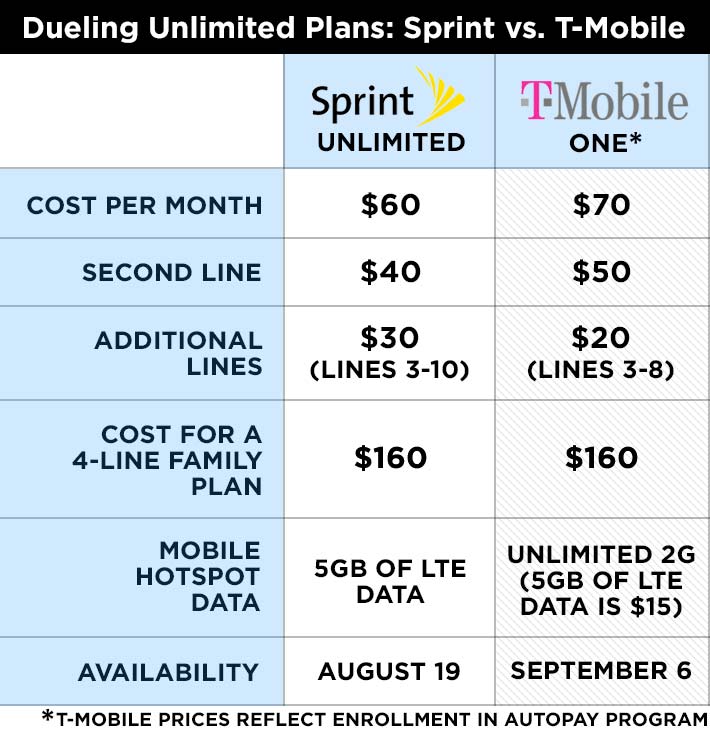Sprint vs T-Mobile: Which Unlimited Data Plan is Better Deal?
Both T-Mobile One and Sprint Unlimited Freedom are good deals, but Sprint looks better for two people or less and T-Mobile for families of four.
Both Sprint and T-Mobile are shaking up their unlimited data plans, with the latter shifting away from tiered data plans. But which carrier offers the best deal for data-hungry users, whether you need a family plan or just an individual one?
To settle that question, let's look at what both Sprint and T-Mobile have to offer with their new unlimited plans.

What Sprint Offers
Sprint's new Unlimited Freedom offering cuts the price on unlimited data to $60 a month for a single line. That's $15 less than what Sprint used to charge users for unlimited talk, text and data. The new plan goes into effect August 19.
MORE: Sprint Phone Plan Buying Guide
For family plans, Sprint offers discounts as you add additional lines. A second line of unlimited data costs $40 a month, so a two-person plan would run you $100. Adding lines after that costs $30 per month for each line, up to 10 lines. That means a family of four would pay $160 a month for an unlimited data plan.
If unlimited data is more than you need, Sprint continues to offer tiered pricing. Plans start at $20 a month for 1GB of data along with unlimited talk and text, though the $30 monthly 3GB plan is more in line with amount of data the average user consumes.
What T-Mobile Offers
T-Mobile's new T-Mobile One plan debuts Sept. 6, offering unlimited LTE data along with unlimited talk and text for $70 a month on a single line. That's $25 less than T-Mobile's current unlimited plan. In fact, T-Mobile One will be the carrier's main data plan going forward, so if you'd rather pay a lower price for a tiered data plan since you don't anticipate needing unlimited data, you'll want to check out prepaid plans from T-Mobile or its MetroPCS subsidiary — or consider another carrier.
Note that T-Mobile told us that it is not eliminating its cheaper Simple Choice plans "right now" but there's no guarantee that they will stick around.
MORE: T-Mobile Phone Plan Buying Guide
Sign up to get the BEST of Tom's Guide direct to your inbox.
Get instant access to breaking news, the hottest reviews, great deals and helpful tips.
T-Mobile says the bulk of its business comes from family plans, and that's where T-Mobile One's true appeal lies. A second line of unlimited data costs $50, while lines three through eight cost $20 each. That means a family of four would pay $160 a month — or $40 a line, as T-Mobile likes to say.
You should also know that the price here require you to enroll in automatic payments with T-Mobile. Otherwise, you'll pay another $5 per month for each line.

Who Wins on Price
It depends on exactly what kind of plan you need. A single user would save $10 a month with Sprint Unlimited; a two-person plan would save $20 each month by opting for Sprint. Pricing becomes more comparable as you add more lines: Both Sprint and T-Mobile charge a family of four $160 a month for unlimited data.
Winner: Sprint, particularly for individuals and two-line plans. For families, it's a draw.
Who Wins on Extras
Both carriers are turning to optimized data streams to supply you with all this unlimited data. In Sprint's case, the carrier says it uses optimization for video, gaming, and music. That means video streams at 480p, gaming at up to 2 Mbps and music at 500 Kbps. Sprint says customers have told them that the streaming quality is indistinguishable at those levels.
Likewise, T-Mobile's video will stream at 480p for T-Mobile One subscribers, with the carrier describing that resolution as "DVD quality." If you want a higher-resolution stream, you can pay T-Mobile $25 a month for each line to get up to 4K video on your phone.
If you use your phone as a mobile hotspot, T-Mobile One offers unlimited hotspot data, but at 2G speeds. For high-speed tethering, you would pay $15 for 5GB. A Sprint spokesperson told us that 5GB of hotspot data is included with its unlimited plan.
Where T-Mobile gets the edge here is with its other extras. Travelers can use their T-Mobile plan in Canada and Mexico just like they would in the U.S. As for the rest of the world, T-Mobile offers unlimited texting and data in more than 140 countries, though data is reduced to considerably slower speeds. The carrier's T-Mobile Tuesday program offers weekly giveaways to subscribers, and new customers are eligible to get one share of stock in the carrier. If you're traveling on a flight the features Gogo's wireless service, you can get an hour of Wi-Fi plus free in-flight texting thanks to your T-Mobile subscription.
Sprint has an Open World program for subscribers that offers free calling and texting when you're in the Americas, plus 1GB of high-speed data. You also get unlimited texting when traveling to many other countries, though Sprint charges for calls and data in 126 other countries and territories.
Winner: T-Mobile
Who Wins on Network Performance
This is where T-Mobile hopes to draw a big distinction, as Sprint's service typically ranks lowest among major carriers in terms of network coverage and performance. Our most recent survey of network speeds put T-Mobile second, just behind Verizon, while Sprint finished in fifth place behind T-Mobile's MetroPCS subsidiary.
Other tests echo those results. Earlier this month, OpenSignal said that T-Mobile had inched past Verizon for the fastest LTE speeds. T-Mobile also outranked Sprint in network availability and download speeds. Sprint took top honors from OpenSignal for latency, a sign of a more responsive network.
Winner: T-Mobile, by a lot
Which Carrier Should You Pick?
T-Mobile's better-performing network gives it an edge over Sprint that could make up for that $10 difference in monthly rates for individual subscribers. Two-person households might find the $20 savings with Sprint too big to overlook, especially if you live in an area where Sprint's network is strong. For families of four, the cost is the same, so T-Mobile's stronger network performance will likely be the deciding factor.
Philip Michaels is a Managing Editor at Tom's Guide. He's been covering personal technology since 1999 and was in the building when Steve Jobs showed off the iPhone for the first time. He's been evaluating smartphones since that first iPhone debuted in 2007, and he's been following phone carriers and smartphone plans since 2015. He has strong opinions about Apple, the Oakland Athletics, old movies and proper butchery techniques. Follow him at @PhilipMichaels.

